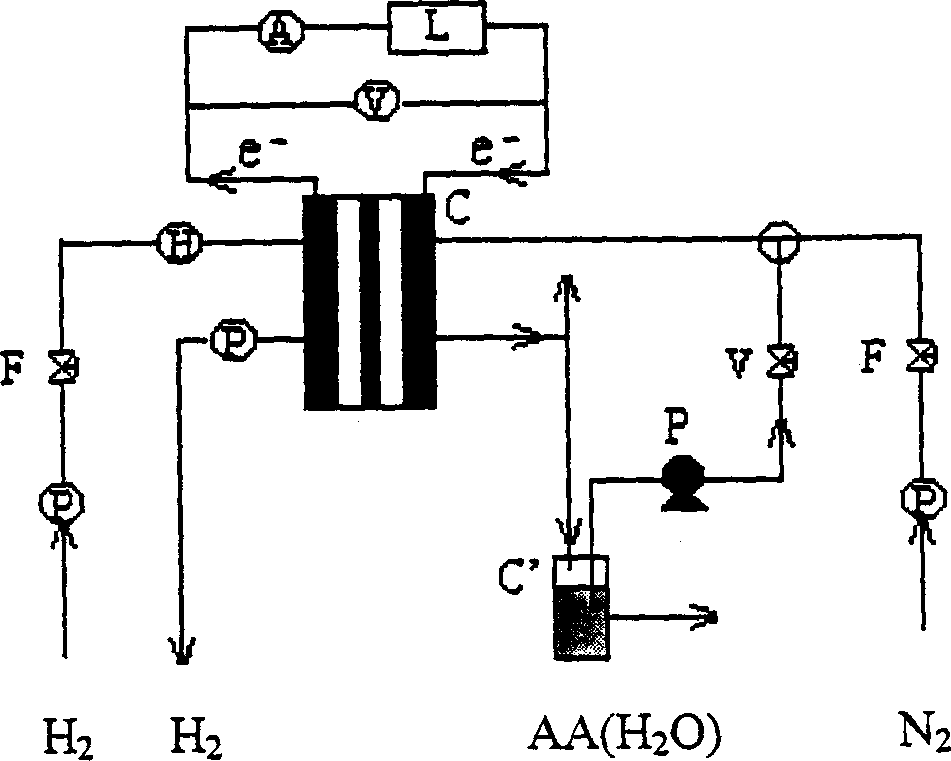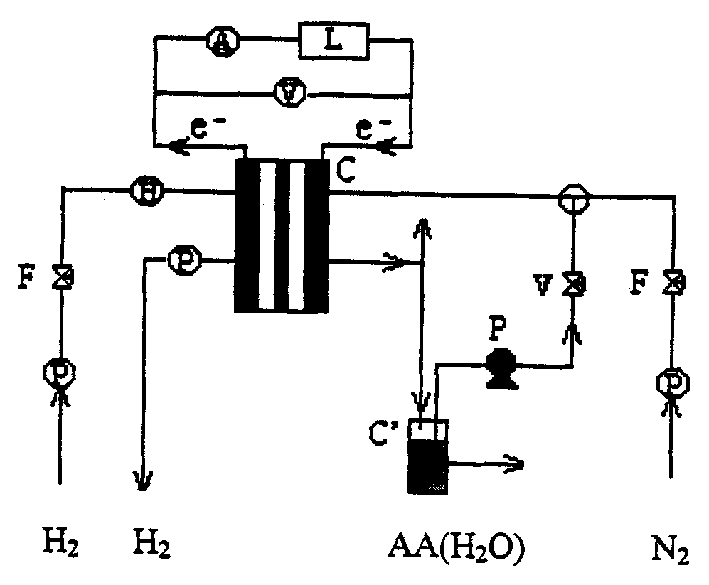Electrochemical synthesis of propanol in protein exchange film fuel cell
A proton exchange membrane, fuel cell technology, applied in fuel cell additives, fuel cell control, organic chemistry, etc., can solve the problems of serious energy consumption, harsh reaction conditions, etc., achieve good competitiveness, mild reaction conditions, increase and decrease load handy effect
- Summary
- Abstract
- Description
- Claims
- Application Information
AI Technical Summary
Problems solved by technology
Method used
Image
Examples
Embodiment 1
[0021] Embodiment 1: Preparation of platinum loading 0.5mg / cm 2 The membrane electrode, and the membrane electrode into the battery. Configure 30ml of 0.5mol / L aqueous solution of propylene alcohol, according to the attached figure 1 Connect the device system and control the battery temperature at 30°C. After the initial polarization, feed hydrogen (the hydrogen flow rate is controlled at 10ml / min), turn on the peristaltic pump (the catholyte flow rate is 1mL / min), and 6.8 mmol of n-propanol can be obtained in 2 hours, with a conversion rate of 16% and a maximum power density of 4.9 mW / cm 2 , the current density at this time is 51mA / cm 2 .
Embodiment 2
[0022] Embodiment 2: Preparation of platinum loading 2mg / cm 2 The membrane electrode, and the membrane electrode into the battery. Configure 30ml of 5mol / L propylene alcohol aqueous solution, according to the attached figure 1 Connect the device system and control the battery temperature at 70°C. After the initial polarization, feed hydrogen (the hydrogen flow rate is controlled at 60ml / min), turn on the peristaltic pump (the catholyte flow rate is 6ml / min), and 7.4mmol of n-propanol can be obtained in 2 hours, with a conversion rate of 18% and a maximum power density of 5.8 mW / cm 2 , the current density at this time is 60mA / em 2 .
Embodiment 3
[0023] Example 3: A typical proton exchange membrane fuel cell porous gas diffusion three-in-one membrane electrode is used, and the membrane electrode is installed in the battery. Configure 30ml of 2mol / L propylene alcohol aqueous solution, according to the attached figure 1 Connect the device system and control the battery temperature at 50°C. After the initial polarization, feed hydrogen (the hydrogen flow rate is controlled at 10ml / min), turn on the peristaltic pump (the catholyte flow rate is 3ml / min), 8.8mmol of n-propanol can be obtained in 2 hours, the conversion rate is 21%, and the maximum power density is 6.2 mW / cm 2 , the current density at this time is 66mA / cm 2 .
PUM
 Login to View More
Login to View More Abstract
Description
Claims
Application Information
 Login to View More
Login to View More - R&D
- Intellectual Property
- Life Sciences
- Materials
- Tech Scout
- Unparalleled Data Quality
- Higher Quality Content
- 60% Fewer Hallucinations
Browse by: Latest US Patents, China's latest patents, Technical Efficacy Thesaurus, Application Domain, Technology Topic, Popular Technical Reports.
© 2025 PatSnap. All rights reserved.Legal|Privacy policy|Modern Slavery Act Transparency Statement|Sitemap|About US| Contact US: help@patsnap.com


